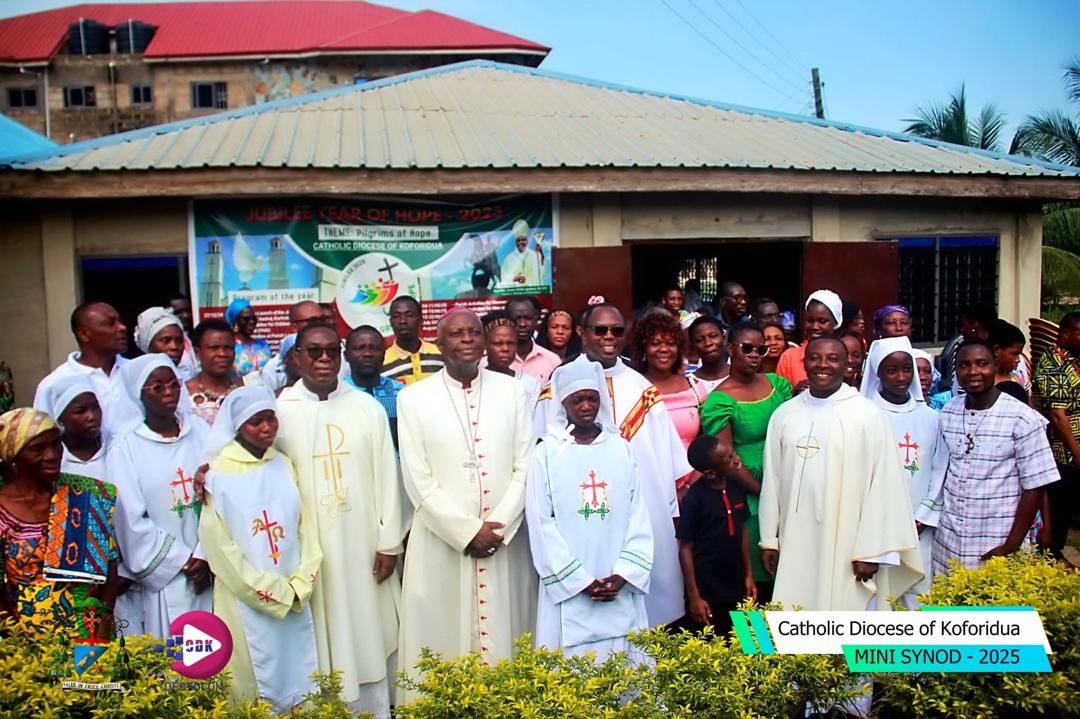 The Catholic Diocese of Koforidua held its 2025 mini synod on March 24-27, 2025 on the theme Revival of the Basic Christian Communities (BCC) and Home Visitation of Pastoral Agents (Priests) in our Parishes: Concept, Structure and Analysis. The Synod, convoked by Very Rev. Fr. Joseph Quainoo Aggrey, the Diocesan Pastoral Director was attended by Most Rev. Joseph Afrifah-Agyekum, the bishop of the diocese, Rev. Msgr. Francis Twum Barimah, the Vicar General, the Diocesan Presbyteral Council, Parish Priests and Priests in-charge of the various parishes and quasi parishes in the diocese, some leaders of departments, offices and societies in the diocese and delegates from all parishes and quasi parishes in the diocese.
The Catholic Diocese of Koforidua held its 2025 mini synod on March 24-27, 2025 on the theme Revival of the Basic Christian Communities (BCC) and Home Visitation of Pastoral Agents (Priests) in our Parishes: Concept, Structure and Analysis. The Synod, convoked by Very Rev. Fr. Joseph Quainoo Aggrey, the Diocesan Pastoral Director was attended by Most Rev. Joseph Afrifah-Agyekum, the bishop of the diocese, Rev. Msgr. Francis Twum Barimah, the Vicar General, the Diocesan Presbyteral Council, Parish Priests and Priests in-charge of the various parishes and quasi parishes in the diocese, some leaders of departments, offices and societies in the diocese and delegates from all parishes and quasi parishes in the diocese.
In the welcome address, Rev. Msgr. Francis Twum-Barimah expressed that, the focus of the synod is to explore more ways of bringing the church closer to the people thus the choice of the theme.
He intimated further that, the concept of BCC is not a novel concept in the church and in the diocese. It is an already existing concept that helps the church in her task of evangelization. He observed that, the practice has become defunct in most of the parishes in the diocese. He thus encouraged all the members of the synod to contribute their ideas in revitalizing this practice in the diocese.
The keynote address, chaired by Very Rev. Fr. Paul Kudordzi Tordzro, was delivered by Rev. Fr. Bernard Soetor, the Diocesan Coordinator of Biblical Apostolate. The address highlighted different ways where pastoral agents can increase home visitation and revitalize BCCs in the parish life of the diocese. He expressed that Small Christian Communities or Basic Christian Communities are grassroots church unit of prayer, scripture and support. He added that, home visitation is a personal connection between pastoral agents and the faithful.
He indicated that, the Church given its magnitude in size is usually plagued with individualism which unfortunately kills the Church. Some of the Church members, he intimated, wander off to other churches because they are not able to find lasting relationship in the church. BCCs, because of their small nature, help members to know one another very well and form closer and supportive relationship in contrast to the rather impersonal links among people in a parish community. The need for relationship is important for the purpose of evangelization which is the mission of the church. Thus the need for the revitalization of the BCCs. These communities must be gospel centred with such activities as bible study and sharing, community prayer and social action projects such as offering services of charity and brotherliness to one another.
For the purposes of reviving BCCs and home visitation in parish life, Fr. Bernard Soetor recommended that pastoral leaders must invest in the formation of leaders of such communities, must adopt the proper use of technology especially in SCCs in Urban communities, ensure proper monitoring and evaluation to track impact and to organize retreats, workshops and liturgical celebrations for spiritual renewal and the sustenance of these communities.
The address was followed by a workshop that discussed various questions on the reviving of BCCs in the diocese. Key to the recommendations by the different groups was the putting together of a working document guiding priests and lay leaders in the establishment and facilitation of BCCs. There were other recommendations including but not limited to the training of lay leaders to facilitate BCCs activities and the establishment of a diocesan committee to exercise oversight and to monitor the progress and activities of BCCs in the diocese. This committee, it is recommended, may be given the added responsibility of designing programmes and activities for these communities in the diocese. The faithful are also encouraged to be willing to offer their homes when possible for the formation of SCCs. People who offer their homes should be welcoming to encourage others to join and neighbours are also encouraged not to find it difficult going to houses earmarked for meetings.
The bishop during his hour thanked all the delegates who have made themselves available for the synod. He encouraged them to own the church by being committed especially financially for the growth of the church in the diocese. He also entreated pastors and leaders of pastoral council to stick to the parish and diocesan strategic plan to help the diocese realize the goals they have set for themselves in the years ahead. He also encouraged parents to be committed in the upbringing of their children and also show keen interest in their education. “The attainment of good grades helps me to get admissions for them in our good Catholic schools” he intimated. He finally, with passion, admonished all not to stop in the education of the public on the evils of ‘galamsey’ and to prevent themselves and families from engaging in this menace.
The synod also featured several other deliberations including finances, welfare, catechetics and the protection of the patrimony of the church or the church’s temporal goods especially land. The synod concluded with a thanksgiving mass at Martyrs of Uganda Catholic Church, Pipeline-Koforidua. The delegates, during the thanksgiving mass, were charged to own the church by being committed and faithful to the teachings of the church.





